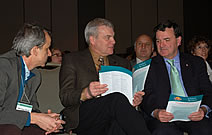Act Now

Empower U: Learn to Access Your Disability Rights Training on Canadian Human Rights, the Convention on the Rights of Persons with Disabilities (CRPD) and its Optional Protocol (OP) training aims to increase awareness of how to address discrimination using more familiar Canadian human rights laws such as Human Rights Codes and the newer international Convention on the Rights of Persons with Disabilities (CRPD). This is training for persons with disabilities by persons with disabilities. The training is part of a project funded by Employment and Social Development Canada and implemented by the Council of Canadians with Disabilities (CCD) in collaboration with Canadian Multicultural Disability Centre Inc. (CMDCI), Citizens With Disabilities – Ontario (CWDO), Manitoba League of Persons with Disabilities (MLPD) and National Educational Association of Disabled Students (NEADS). Read more.
Sign Up for our monthly digest
A monthly newsletter from CCD about what is happening in the community
Turning the Corner: Transformational Change on Disability
Related Documents
October 7, 2009
National Action Plan Video
September 22, 2009
End Exclusion 2009 Agenda
July 14, 2008
Your Help Is Needed!
Briefing note prepared jointly by the Council of Canadians with Disabilities (CCD) and the Canadian Association for Community Living (CACL), October 2005
Issue: The FPT Ministers of Social Services are meeting in Ottawa October 19-20, 2005 to discuss options for moving forward with the development of a joint investment for a disability strategy. CCD and CACL believe that this meeting represents an opportunity for taking clear and bold steps in transforming disability supports and addressing the poverty of persons with disabilities and their families.
Context: Over the last several years, governments have made important investments in disability and taken action in some areas but current measures are narrow in scope and remain inadequate to make true and lasting change. A signal that major changes need to be made is the fact that 56.5% of persons with disabilities are currently unemployed or out of the labour market and the disproportionate levels of poverty faced by persons with disabilities and their families - rates that are unacceptable for any group in an inclusive society and a G8 country like Canada.
Currently, there is unprecedented consensus among the Canadian public, governments, the disability community and experts about the need for national action on disability. Exclusion, poverty and a lack of access to needed disability supports negatively impact on the earning power and income levels of persons with disabilities and their families, thus weakening their productivity and role in Canada's future.
Enough is enough. There have been more than 25 years of reports and studies (see attachment) - all calling for action. The issues, though complex and multi-jurisdictional, are well understood and several potential solutions have been offered.
There is an opportunity for transformational action. Current programs are sunsetting. Fiscal limitations of province and territories are creating barriers to substantial new investment. Persons with disabilities and their families are not interested in more of the same. Now is the time for change, even a first step.
Disability supports is the immediate issue. Properly executed, a new approach to disability supports is the lever for transformational change instead of perpetuating well-known systems of poverty, welfare and exclusion.
Our Request of Federal, Provincial and Territorial Governments:
- Establish an 'early win' with an immediate downpayment in Budget 2006. Targeted at flowing funding to provinces and territories to improve disability supports.
- Increase investment from current levels and provide for accountability, joint participation and flexibility in cost sharing.
- Find different and innovative ways to ensure investments trigger change. Including taking action on InUnison, e.g. individualized dollars that follow the person.
- Go beyond the tax system to enhance program spending (as recommended by the Technical Advisory Committee on Tax Measures).
Conclusions: Concerted efforts and a joint strategy by federal, provincial and territorial governments are essential. Need both an early win on disability supports and the development of a long-term strategy to address the poverty of persons with disabilities and their families through a long-term disability agenda (Budget 2007 and beyond). Now is the time for action.

Michael Bach, CACL, and Laurie Beachell, CCD National Coordinator, share the National Action Plan with Finance Minister Flaherty.
